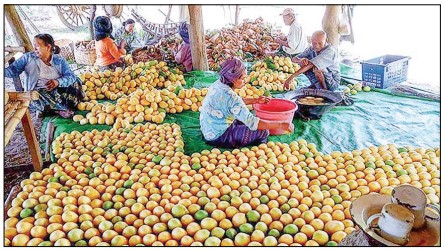MYANMAR’S mango export has generated US$278 million in income in the first half (from October to March) of the current financial year 2020-2021, according to the Myanmar Customs Department.
This year, mango export remarkably dropped due to the closure of the Man Wein border triggered by the COVID-19 negative impacts. U Kyaw Soe Naing, general secretary of Myanmar Mango Market and Technology Development Association, said Seintalone mango exports this year are about 50 per cent less than in the corresponding period last year.
“The drop in mango export is attributed to China’s restriction in some border areas amid the COVID-19 and delays related to the COVID-19 containment measure (COVID-19 test for food packaging). “China shut many border posts. Only Kyinsankyawt post is available for cross-border trade, causing delays and long queue. It takes 4 to 5 days for a truck to enter the checkpoint. Heighten security measures on fruits and vegetables hinders the border trade,” U Kyaw Soe Naing continued. Seintalone mangoes from Sagaing and Katha cities are daily sent to China with the use of 10 to 15 trucks, the Myanmar Mango Market and Technology Development Association stated. Eight per cent of Myanmar’s Seintalone goes to China.
It fetches 100 Yuan per 16 kg box. Of about 200 mango varieties that originated in Myanmar, Seintalone, Shwehintha, Padamyar Ngamauk, Yinkwe and Machitsu varieties are primarily grown. The foreign market prefers the Seintalone variety.
Ayeyawady Region possesses the most extensive mango plantation acres, having about 46,000 acres. Bago Region is the second-largest producer with 43,000 acres, and Mandalay has 29,000 acres of mango.
According to the association, there are over 24,000 acres in Kayin State, over 20,400 acres in Shan State and over 20,000 acres in Sagaing Region. Beyond China, the leading trade partner, Myanmar’s mangoes were shipped to India, Bangladesh, Thailand, the Republic of Korea, Singapore, and Japan in the previous years. Mango farm-owners need to follow Good Agricultural Practices (GAP). They also need to obtain GAP certification. The Agriculture Department has been striving for long-term organic farming. — GNLM



